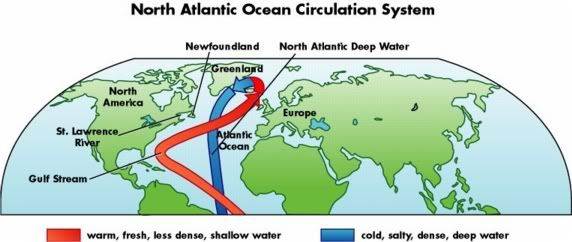
The Gulf Stream currents that give Britain its mild climate have weakened dramatically, offering scientific evidence of a slowdown that threatens the country with temperatures as cold as Canada’s.
Scientists have long predicted that melting ice caps could disrupt the currents that keep Britain at least 5C (40F) warmer than it should be, but the new research suggests that this is already under way. It points to a cooling of 1C over the next decade or two, and an even deeper freeze could follow if the Gulf Stream system were to shut down altogether.
The British Isles lie on the same latitude as Labrador on the East Coast of Canada, and are protected from a similarly icy climate by the Atlantic conveyor belt, which carries a million billion watts of heat. Although oceanographers still think it unlikely that the currents will stop completely, this could reduce average temperatures by between 4C and 6C in as little as 20 years, far outweighing any increase predicted as a result of global warming.
Even a lesser fall in temperatures could mean that Britain gets colder even as the rest of the world warms up, and would severely disrupt the Government’s plans for mitigating the effects of climate change.
Global warming is predicted to disrupt this process, as extra freshwater from melting ice caps reduces the salinity of the Arctic waters, stopping it from sinking and breaking the circuit. The Southampton team measured current flow across a latitude of 250N. The original Gulf Stream, cold water returning from the Arctic, and the southern branch of warm water all cross this line stretching from North Africa to the Bahamas.
The results, published in Nature, show that the strength of the cold water returning from the Arctic has fallen by 30 per cent since 1992. Over the same period, the flow of warm water branching off towards Africa has increased by 30 per cent. This suggests that the warm waters are being diverted away from Europe.
An armada of robot submarines and marine sensors are to be deployed across the Atlantic, from Florida to the Canary Islands, to provide early warning that the Gulf Stream might be failing, an event that would trigger cataclysmic freezing in Britain for decades. The £16m system, called Rapid Watch, will use the latest underwater monitoring techniques to check whether cold water pouring south from melting Arctic ice sheets is diverting the current's warm waters away from Britain.
'The Day After Tomorrow suggested the Gulf Stream could fail within a couple of days,' said Rapid Watch's co-ordinator, Meric Srokosz of the National Oceanography Centre, Southampton (NOCS). 'In reality, a collapse will take a lot longer, but could still occur in about 10 years.' Rapid Watch has been designed to discover if such weakening is already occurring or is about to begin.
East Berks GP
science daily
Woods Hole Oceanographic Inst






9 comments:
I am well aware that the temperature of the earth is taken at many places thoughout the year and the results compiled to achieve an average , and therefore the temperatures in the UK like those we have recently experienced don't nessessarily count for much, but the fact remains of the peak in 1998 and the slight decline since. Doesn't really fit the theory does it ?
I have already answered this question Howard, can we move on to the next one?
Just look up El Nino.
http://www.youtube.com/watch?v=yDTUuckNHgc&feature=player_embedded# is quite good, 'It's so Cold, there can't be Global Warming'answered.
Spoken like a true politician........The planet has cooled slightly since 1998 and you don't want to hear it !
I have answered this point many times, is there any point continuing to repeat myself?
Not really , unless it makes sense
If you don't understand it say so.
Just repeating the same point on different posts will not help.
I understand perfectly well .....I understand that some of the ups and downs in temperatures don't fit the global warming theory, and as yet I haven't heard a rational explanation (and I don't really expect to because there doesn't seem to be one)
I have sent any number of links that prove it.
You choose to persist in believing something else.
Post a Comment